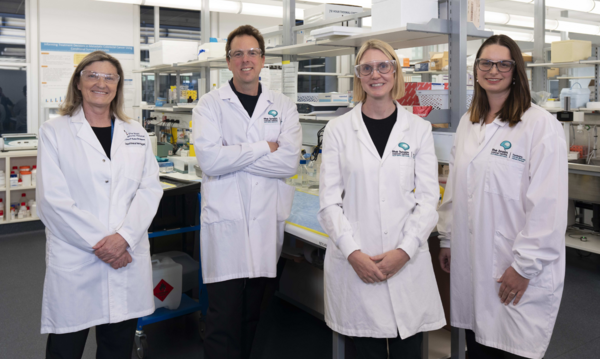Victorian researchers have achieved a world-first breakthrough in brain cancer research, showing how a new drug can suppress tumour activity in patients with low-grade gliomas (LGG).
The study, published in Nature Medicine, offers fresh hope for patients with this slow-growing but devastating form of brain cancer.
The clinical trial is the first to be conducted through the Brain Perioperative platform, or BrainPOP, a pioneering initiative led by The Brain Cancer Centre and funded by the Victorian Government. BrainPOP is designed to transform the way brain cancer treatments are tested, linking laboratory research directly to patient care.
Low-grade gliomas are a type of brain cancer most commonly affecting young adults. A mutation in the IDH gene characterises them and, despite being slow-growing, they are considered incurable. Current treatments are limited, and survival rates across brain cancers have barely shifted in three decades.
The new approach centres on safusidenib, an oral drug that targets the IDH1 mutation.
Researchers from the Royal Melbourne Hospital (RMH), WEHI, and the Peter MacCallum Cancer Centre tested the drug’s impact by taking tumour samples from patients before and after treatment. It is the first time this kind of perioperative trial design, standard in other cancers, has been applied to brain cancer.
“This trial is not only a revolution in the way we test new treatments but brings new opportunities for this most deserving group of patients with a devastating disease,” said Professor Kate Drummond, Director of Neurosurgery at RMH and lead investigator. “Brain cancer patients are desperate for new treatments, and clinical trials like this are exactly what is needed.”
Professor Drummond said patient support for the trial was overwhelming, with many volunteering to undergo two operations and intensive treatment. “Even though the trial required two surgeries, patients were excited to be part of something that could change the outlook for people with brain cancer.”
Dr Jim Whittle, medical oncologist at Peter Mac and laboratory head at The Brain Cancer Centre and WEHI, said the BrainPOP approach allows researchers to see precisely how drugs work in the brain. “These types of trials are vital for advancing drug development, but because of the complex and sensitive nature of neurosurgery, they have not been used in brain cancer before,” he said.
“This new study shows the power of BrainPOP as a safe and effective platform for accelerating our understanding of new treatments. For the first time, we’ve seen what a drug is doing in the brain with incredible detail, helping us to identify the next steps for personalising treatment and predicting who will benefit most.”
The pilot study involved patients who had not yet undergone chemotherapy or radiotherapy, making it a world-first for IDH inhibitors in brain cancer. While it is too early to know whether safusidenib will improve survival, the study demonstrates activity against the tumour and establishes a path for larger, pivotal trials now being planned.
The project was made possible by a $16 million investment from the Victorian Government, part of its strategy to cement the state as a global leader in brain cancer research. “We will continue to support our world-class researchers to make these life-changing discoveries,” said Victorian Minister for Economic Growth and Jobs, Danny Pearson.
The BrainPOP trial is part of a collaborative effort across the Melbourne Biomedical Precinct, bringing together experts from RMH, WEHI, Peter Mac, Murdoch Children’s Research Institute, the Royal Children’s Hospital, the University of Melbourne and others. International collaborators included MoleQlar Analytics in Germany, with industry support from AnHeart Therapeutics, a Nuvation Bio company.
The study was co-led by Professor Drummond, Dr Whittle, Dr Sarah Best and Dr Saskia Freytag, who combined clinical, biological and bioinformatics expertise. “Our ultimate goal is to radically transform outcomes for patients with brain cancer, and BrainPOP is key to achieving this,” said Dr Whittle.
Founded in 2021 by Carrie’s Beanies 4 Brain Cancer in partnership with WEHI and the Victorian Government, The Brain Cancer Centre is driving a new era in Australian brain cancer research. With further BrainPOP trials already in development, researchers are hopeful this innovative approach will open the door to faster, more effective treatments for patients who urgently need them.
